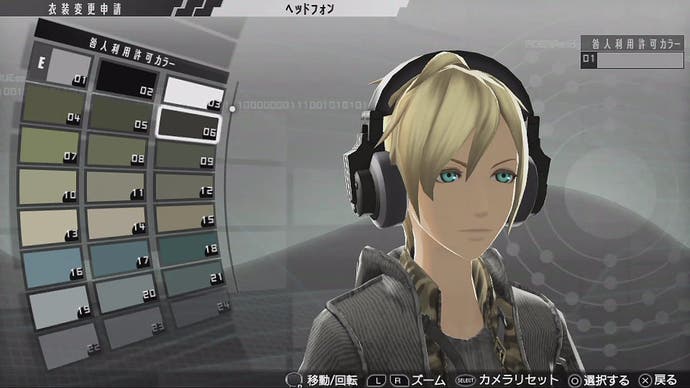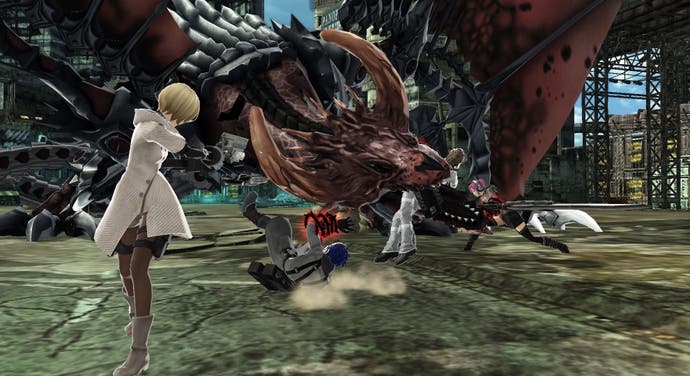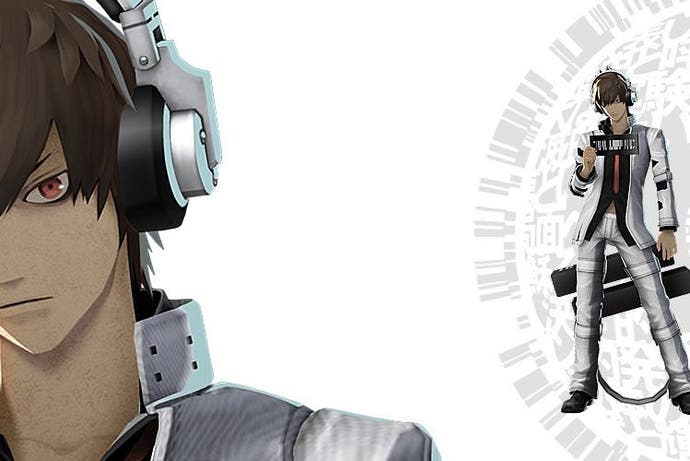Freedom Wars review
Thorny issue.
Some time ago in a college psychology course, I recall hearing a professor describe, at length, how important agency is to mental health. We need to know that the actions we take will have an effect on the world around us, and that we have some measure of control - no matter how small - over own future. When we're denied that, we tilt into fatalism. We lose hope and give into a pervasive malaise as we internalise fissures between will and result.
Freedom Wars steeps itself in this mentality, albeit with a twist.
It's more than 100,000 years in the future and humanity has thoroughly depleted Earth's natural resources. To survive, the few remaining civilizations constructed city-states called Panopticons, which operate like pseudo communist military dictatorships. Everyone is divided into one of two classes - sinners and citizens. The former are sentenced to a minimum of one million years of servitude just for being born, the logic being that even existence is a drain on critical resources. Sinners try their best to work off their sentences by running missions to the outside world, fighting other cities for the scant supplies that have yet to be plundered. These excursions form the lion's share of Freedom Wars' play, and establish the action foundation onto which a smattering of light role-playing elements have been welded.
Each of these missions takes place in one of five or so different levels, and will pit you and a team of three others against massive robots as well as sinners from other cities, all while laying out a clear set of objectives that you'll need to complete. To even out the odds, sinners have access to thorns - barbed threads of tech that can latch onto just about anything. It can allow you to make quick, complicated jumps, grapple enemy mecha, and even potentially drag down a mighty foe with the help of your teammates. They can also bind enemies, create healing fields, or shield your group from damage.

The interplay between the different capabilities of thorns, your standard attacks, and the coordination of your team sow some of the game's most special moments. Few experiences are quite as gratifying as tearing these mechanical beast limb from limb while you struggle to avoid their devastatingly powerful attacks. At its best, Freedom Wars can feel like a cooperative, sci-fi Shadow of the Colossus. These monsters are tough, take forever to kill, and are absolutely awe-inspiring. All this is unfortunately undermined by a dozen or more poor design choices.
The selection of levels is thin. Since you'll be participating in a lot of battles, and since many of them can last for upwards of 30 minutes, the stages lose their lustre far faster than they should. Perhaps worse is the fact that so much of the game's movement systems are built to allow for some verticality. That's remarkably empowering when battling colossi, but the arenas really aren't built to support that kind of play. Even the best areas have invisible walls to cap your height and limit your ability to approach your enemies. The result is a combat system that is capable of facilitating some incredible gaming experiences, but it's restricted to the point where it feels flaccid and tedious. And the problems unfortunately don't end there.
As you might expect, controlling an avatar that can, more or less, move in any given direction at will comes with it some control challenges - particularly with button placement on the Vita. Given that these battlefields have to be as massive as your foes, running and using your thorn properly are essential. Linking the two seamlessly would have been ideal, but Freedom War's control system is instead clumsy and cluttered.
Indeed, much of Freedom Wars feels awkward. Role playing is limited and repetitive as the main missions. Set as it is in a post-apocalyptic world teetering on the brink, I expected Freedom Wars to be more... interesting. There's an enormous amount of potential for some spectacular, or at the very least, creative locales. The game contains within its ingredients an extraordinarily stark class warfare with some dark themes drizzled on, but those ideas aren't built into the game's world.
As I was steadily cutting down my sentence and literally moving up in the Panopticon, I noticed that my scenery stayed the same. The first floor looks more or less identical to the second, the third, etc. It robs the progression of any visual support and keeps the allegedly stark classes from feeling as distinct as we're told they are. This isn't to say that all of the art direction is flat; monsters and characters are wonderfully detailed, and it's a wonder that the same attention and care wasn't extended to the rest of the experience. Instead, the world feels empty, hollow, and soulless.

Superficially, it'd seem like Freedom Wars has a lot in common with Orwell's 1984. Panopticon essentially means eyes everywhere. Constantly watching, constantly judging, and constantly enforcing the ludicrous laws of these city-states. After 20 some-odd hours of play though, I'm not really sure the game supports that interpretation.
Where 1984 is weighty and sombre, Freedom Wars seems borderline mad. As a sinner, you are constantly under the scrutiny of your city, and it considers essentially everything to be a "waste of resources." Talking gets you in trouble. Not talking gets you in trouble. Sleeping when told that you're too tired to work carries a hefty punishment, but so does turning down the offer for rest. The violations of the Panopticon's draconian rules are so common that it's something of a joke. Most of these infractions carry punishments ranging from 10 to 200 years added onto your original sentence, but given that you start with a million years the repressiveness is undermined by the comedy of it all.
The Vita is so starved of meaty releases right now that I'd love to recommend it. In my heart though, I know that's folly. There are a few people for whom Freedom Wars will be a godsend, but for me it was just plain boring. Its highlights are sparse enough - amazing though they may be - that the rest of the game feels like mindless drudgery, and that's the worst disposition to have for an RPG.
All it would take to save Freedom Wars is for it to get even one big thing right. As it stands, combat is the brightest highlight, though it's still dulled by clumsy controls. Beyond that, the environments are so monotonous as to kill any passion for the thing. The plot has some strong ideas that never really pan out, so I can't recommend it for that either. In between those two bits of mediocrity lies hours of wandering around the same grey-brown hallways, grinding to cut your sentence down. If you're really desperate for a new Vita game, maybe with some friends playing by your side you can see through the blandness. I'm just glad my time's been served









